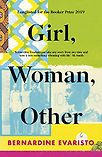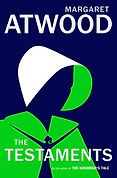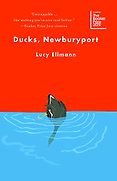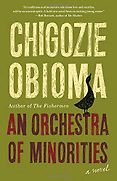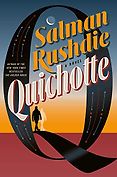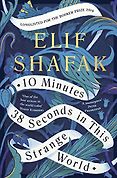As chair of the 2019 Booker Prize judging panel, you helped whittle down this huge pile of fiction books from over 100 down to the six novels that we have here. What was that process like, and what was the timeline of reading and discussing the books?
We started in January and read 30 books a month for the first six months. Every month, we would meet and discuss which of those 30 we wanted to forward to a consideration list for the longlist.
Interestingly enough, I don’t think we ever had to vote. We talked our way through them and came to a consensus about the ones that we loved and most wanted to recommend. As judges, we all come from very different places, have different tastes and different experiences, and so on. It was astonishingly enriching to find that the conversation opened new avenues of thought about each of the books for us. So yes, it was like having a lovely sort of all-star book club.
Let’s start with Margaret Atwood. Her novel The Testaments (2019) is the long-awaited follow-up to The Handmaid’s Tale. For people who are lovers of that book, what can they expect from The Testaments, and what did you all as a panel see in it?
What we saw in it is that it is a completely standalone, independent novel. If you read The Handmaid’s Tale, it will satisfy some of your need for understanding what happened next. If you haven’t—and incredibly, there are people who haven’t read it—it just gives you an extremely savage and exhilarating look at contemporary life and its most alarming manifestations.
Atwood manages to set her own bar very high and get over it. That’s a hell of a thing for a book of which a lot is expected.
Especially for a writer who has released over 50 books, you’d think at some point by 2019 it’d get harder to do something new.
You’d think! Part of the challenge is reading it again in the context of the publication hype and expectation, the backlash, the whole nine-ring circus. I think we were very lucky to read it first before all that started. Atwood plays with thriller conventions and our expectations of drama to pull our focus, always, onto her subject matter. It’s phenomenal storytelling and inspiration.
Next, we have Lucy Ellmann’s Ducks, Newburyport (2019), which, if it wins, would be the longest winner to date at over a thousand pages. Tell us a bit more about the book for those who haven’t read it—which is to say: most of us.
It’s the stream of consciousness of an Ohio housewife who muses on life, politics, society and nature, and it’s absolutely compelling. The voice she creates is fascinating.
It’s a fantastic comic riff that feels a lot like an updated, wisecracking version of James Joyce’s Molly Bloom. You get the sense of a whole life and a real imagination at work. And although it’s a thousand pages, you read it with energy and pace and verve. It’s just a great ride. Everybody I have given it to has loved it.
So we shouldn’t be thinking of this as some difficult, insurmountable long work?
Oh hell no! In many ways, it’s the easiest to read of all the books on the shortlist because of the way the author handles the reader. She takes you on a wonderful dance and it’s a joy to play with that.
Third, we have Bernardine Evaristo’s novel Girl, Woman, Other (2019). Tell us about this one.
It’s written in a very unusual way. It has, I suppose, a poetic structure; she uses blank verse a lot. She plays with the lives of 12 black women in Britain, and there are plot twists—which I don’t want to spoil—about their connections.
Again, you get the sense in this book of real lives lived. They feel so vibrant, so vivid, and so full of energy and life that it’s like coming across a whole new bunch of friends who you care about deeply. You also realize that these are people who are not very familiar from contemporary literature. They haven’t had their stories told so brilliantly and so persuasively before now.
I cannot imagine anyone not enjoying this novel. As an author she possesses a prolific voice; she’s got 12 voices, all of which are distinct and engaging and vulnerable in different ways and utterly compelling.
Is that part of what you think about when you make the impossible choices in moving from longlist to shortlist? You might have two books which are each incredible, but one truly has never been done in that kind of way before, or told certain stories so persuasively before.
It’s so tough. The move from longlist to shortlist has the bizarreness of being reductive, not expansive, and that feels strange for someone who spends their bulk of their professional life trying to celebrate more and more literature.
The thing I would say about all these six novels is that I could easily and happily stand up and make the case for any of them as a winner, and I have no idea who’s going to win in the follow-up on the 14th. I hope that we will discover more about each of the books when we get to talk about them again, in this third reading of them.
Tell me a bit about the next work of fiction on the shortlist, An Orchestra of Minorities (2019) by Chigozie Obioma.
It’s the book that, to me in Britain, was in some ways the most foreign, in that it deals with a belief system and a central character beyond my immediate point of cultural reference. The wonder of it is that it takes this animating spirit guardian narrator and makes it seem completely natural.
Five Books interviews are expensive to produce. If you're enjoying this interview, please support us by donating a small amount.
Obioma inducts you into this culture of this story with this heart-rending, beautiful hero and his quest and makes it completely immersive. In that sense, it’s the one book on the list in which you travel more in stranger lands, but with such power and with such clever narrative technique. He tells a story in a paragraph that spills out completely onto the page.
And he’s a wonder: he’s 33, this is his second novel, and both have been shortlisted for the Booker. That’s quite an exceptionally gifted talent. This is a great book and I think it’ll find big audiences around the world.
For our second to last book, we have the second literary superstar on the list along with Atwood: Salman Rushdie, famous of course for masterpieces like Midnight’s Children. Tell us about his newest novel, Quichotte (2019).
This is a big book, and he’s doing his stuff, and he’s doing his stuff brilliantly. It’s a really full-on, absolutely uncompromising maximalist novel. It’s very entertaining, clever and politically acute.
Once you read it, you look at this guy who’s trying to take on Cervantes and see that he gives him a good run. It’s a huge ambition, and he’s pulled it off on his own crazy terms.
If you love storytelling and you love popular culture, this is just a dream book because it rips along. At the same time, it is an astonishingly careful and lucid engagement with Don Quixote, the greatest novel of the European tradition. There’s a pleasure just in the game as they play with each other.
Get the weekly Five Books newsletter
It’s both wildly unfamiliar and really pleasingly recognizably Rushdie at the top of his game. So yes, it’s a good, good book, but not unlike Atwood, the bar is set high for him. I don’t want to have something that wasn’t as good as Midnight’s Children on the list. I wanted something wonderful, and he’s delivered it.
Last, we have Elif Shafak, with 10 Minutes 38 Seconds in This Strange World (2019). Tell us about this book.
Like Evaristo’s book, in this novel, you get this sense of knowing a whole bunch of people who are this weirdly close-knit and beautiful group of friends. It’s about Istanbul in all its wealth and diversity, but it’s also about rape and trauma, exploitation and violence. And it’s about a life that resonates beautifully.
I’m intrigued by the fact that this is a second or third language; she seems to have absolute control of the poetry, and at the same time the ability to conjure characters who, in a way, absolutely don’t feel at all like characters. They feel like people. It’s a great trick of fiction, and she does it beautifully.
Well, it sounds like you have a very difficult choice in front of you.
Absolutely.
So what’s the process like for you and the rest of the judging panel over the next month?
We have the great luxury of a book a week rather than a book a day! We’ll meet on October 14th and we’ll talk through until we’ve come up with the winner, at the very last minute. We decide on the day, and I have no idea who’s going to win. Literally no idea. It could go anywhere, any which way, under a variety of different circumstances. We’ll see!
Five Books aims to keep its book recommendations and interviews up to date. If you are the interviewee and would like to update your choice of books (or even just what you say about them) please email us at [email protected]

